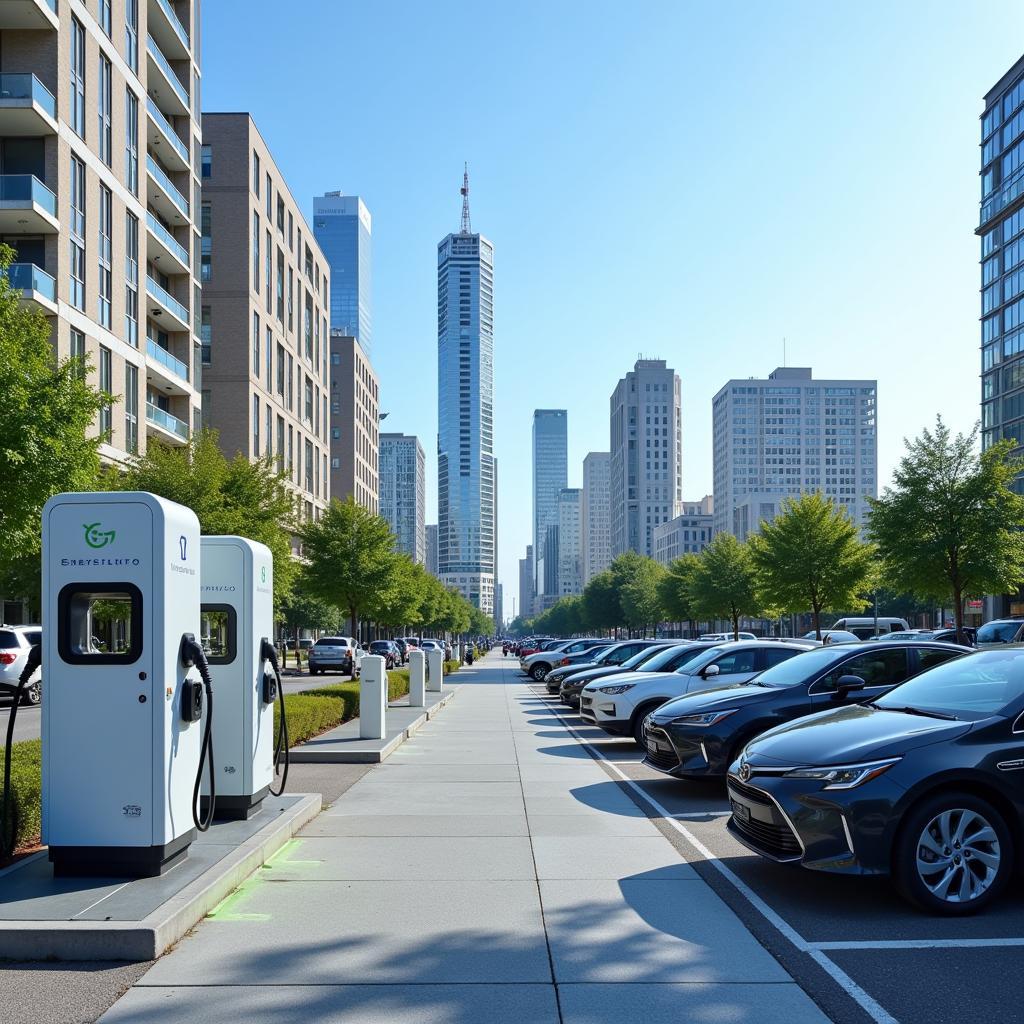Air pollution in cities and sustainable transportation solutions, particularly electric vehicles, have become increasingly common topics in IELTS Writing Task 2. Based on analysis of past IELTS exams and trends, this theme has appeared frequently in various forms since 2019, especially in Asian test centers where air quality is a major concern. Let’s examine one of the most relevant questions from recent tests.
Task Analysis and Sample Question
Some people believe that governments should provide incentives to promote the use of electric cars to reduce air pollution in cities. To what extent do you agree or disagree with this statement?
This question addresses why electric vehicles are essential for reducing pollution while testing your ability to evaluate government policies and environmental solutions.

Band 8 Sample Essay
Cities worldwide are grappling with severe air pollution, and I strongly agree that governmental support for electric vehicles (EVs) is crucial for addressing this environmental challenge. This essay will explain why such incentives are necessary and how they can effectively reduce urban air pollution.
Financial incentives for electric cars can significantly accelerate their adoption rate. When governments offer tax breaks, subsidies, or direct cash rebates, they make EVs more affordable for average consumers. For instance, Norway’s comprehensive incentive program, including tax exemptions and free parking, has resulted in electric vehicles comprising over 50% of new car sales. This demonstrates how government support can transform the automotive market towards cleaner alternatives.
Moreover, government incentives can help develop the necessary infrastructure for widespread EV adoption. By providing funding for charging stations and requiring new buildings to include charging facilities, authorities can address the “range anxiety” that often deters potential buyers. This approach has been particularly successful in cities like Amsterdam, where extensive charging networks have made electric vehicles a practical choice for urban residents.
However, for maximum effectiveness, these incentives should be part of a comprehensive strategy that includes advantages of public transportation over private vehicles. Cities should also invest in renewable energy sources to ensure that the electricity powering these vehicles comes from clean sources, maximizing their environmental benefits.
In conclusion, government incentives for electric vehicles are essential for reducing urban air pollution. The success of such programs in various countries demonstrates their effectiveness in promoting cleaner transportation alternatives.
Band 6.5 Sample Essay
I agree that governments should give incentives for electric cars to reduce pollution in cities. This essay will discuss the benefits and some problems of this approach.
Firstly, government help can make electric cars cheaper. Many people want to buy electric cars but think they are too expensive. When governments give money back or reduce taxes, more people can afford these cars. For example, in China, government support has helped many people buy electric cars, and now there are more electric cars on the roads.
Another good point is that electric cars make cities cleaner. Normal cars produce a lot of smoke and bad gases, but electric cars don’t make any pollution when driving. This is very important for big cities where pollution is very bad. For information about Alternative fuels for transportation, many studies show this clearly.
However, there are some problems too. Governments need lots of money to give these incentives, and this money must come from somewhere. Also, we need many charging stations, which also costs money. Sometimes the electricity for these cars comes from coal power stations, which still causes pollution.
In conclusion, I think government incentives for electric cars are a good idea, but they need to be part of a bigger plan to reduce pollution. Encourage electric cars: advantages and disadvantages should be carefully considered.
Analysis of Band Scores
Band 8 Essay Analysis
- Strong coherence and cohesion with clear paragraphing
- Sophisticated vocabulary: “grappling with,” “comprehensive strategy,” “range anxiety”
- Well-developed arguments with specific examples
- Complex sentence structures
- Clear position maintained throughout
Band 6.5 Essay Analysis
- Basic but clear organization
- Limited range of vocabulary with some repetition
- Simple but relevant examples
- Mixture of simple and complex sentences
- Some cohesive devices used effectively
Key Vocabulary
- incentive (n) /ɪnˈsen.tɪv/ – something that encourages a particular action
- infrastructure (n) /ˈɪn.frə.strʌk.tʃər/ – basic systems and facilities
- comprehensive (adj) /ˌkɒm.prɪˈhen.sɪv/ – complete, including all aspects
- adoption rate (n) /əˈdɒp.ʃən reɪt/ – speed at which new technology is accepted
- range anxiety (n) /reɪndʒ æŋˈzaɪ.ə.ti/ – worry about electric car battery life
Consider practicing with these similar topics:
- The role of public transportation in reducing urban pollution
- Government policies for sustainable urban development
- Alternative energy solutions for urban transportation
Share your practice essays in the comments section for feedback and discussion.